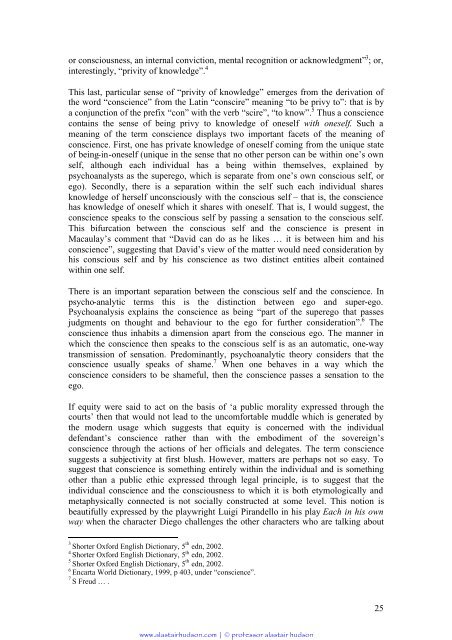England's dreaming equity, trust and conscience - alastairhudson.com
England's dreaming equity, trust and conscience - alastairhudson.com
England's dreaming equity, trust and conscience - alastairhudson.com
Create successful ePaper yourself
Turn your PDF publications into a flip-book with our unique Google optimized e-Paper software.
or consciousness, an internal conviction, mental recognition or acknowledgment” 3 ; or,interestingly, “privity of knowledge”. 4This last, particular sense of “privity of knowledge” emerges from the derivation ofthe word “<strong>conscience</strong>” from the Latin “conscire” meaning “to be privy to”: that is bya conjunction of the prefix “con” with the verb “scire”, “to know”. 5 Thus a <strong>conscience</strong>contains the sense of being privy to knowledge of oneself with oneself. Such ameaning of the term <strong>conscience</strong> displays two important facets of the meaning of<strong>conscience</strong>. First, one has private knowledge of oneself <strong>com</strong>ing from the unique stateof being-in-oneself (unique in the sense that no other person can be within one’s ownself, although each individual has a being within themselves, explained bypsychoanalysts as the superego, which is separate from one’s own conscious self, orego). Secondly, there is a separation within the self such each individual sharesknowledge of herself unconsciously with the conscious self – that is, the <strong>conscience</strong>has knowledge of oneself which it shares with oneself. That is, I would suggest, the<strong>conscience</strong> speaks to the conscious self by passing a sensation to the conscious self.This bifurcation between the conscious self <strong>and</strong> the <strong>conscience</strong> is present inMacaulay’s <strong>com</strong>ment that “David can do as he likes … it is between him <strong>and</strong> his<strong>conscience</strong>”, suggesting that David’s view of the matter would need consideration byhis conscious self <strong>and</strong> by his <strong>conscience</strong> as two distinct entities albeit containedwithin one self.There is an important separation between the conscious self <strong>and</strong> the <strong>conscience</strong>. Inpsycho-analytic terms this is the distinction between ego <strong>and</strong> super-ego.Psychoanalysis explains the <strong>conscience</strong> as being “part of the superego that passesjudgments on thought <strong>and</strong> behaviour to the ego for further consideration”. 6 The<strong>conscience</strong> thus inhabits a dimension apart from the conscious ego. The manner inwhich the <strong>conscience</strong> then speaks to the conscious self is as an automatic, one-waytransmission of sensation. Predominantly, psychoanalytic theory considers that the<strong>conscience</strong> usually speaks of shame. 7 When one behaves in a way which the<strong>conscience</strong> considers to be shameful, then the <strong>conscience</strong> passes a sensation to theego.If <strong>equity</strong> were said to act on the basis of ‘a public morality expressed through thecourts’ then that would not lead to the un<strong>com</strong>fortable muddle which is generated bythe modern usage which suggests that <strong>equity</strong> is concerned with the individualdefendant’s <strong>conscience</strong> rather than with the embodiment of the sovereign’s<strong>conscience</strong> through the actions of her officials <strong>and</strong> delegates. The term <strong>conscience</strong>suggests a subjectivity at first blush. However, matters are perhaps not so easy. Tosuggest that <strong>conscience</strong> is something entirely within the individual <strong>and</strong> is somethingother than a public ethic expressed through legal principle, is to suggest that theindividual <strong>conscience</strong> <strong>and</strong> the consciousness to which it is both etymologically <strong>and</strong>metaphysically connected is not socially constructed at some level. This notion isbeautifully expressed by the playwright Luigi Pir<strong>and</strong>ello in his play Each in his ownway when the character Diego challenges the other characters who are talking about3 Shorter Oxford English Dictionary, 5 th edn, 2002.4 Shorter Oxford English Dictionary, 5 th edn, 2002.5 Shorter Oxford English Dictionary, 5 th edn, 2002.6 Encarta World Dictionary, 1999, p 403, under “<strong>conscience</strong>”.7 S Freud … .25www.<strong>alastairhudson</strong>.<strong>com</strong> | © professor alastair hudson













